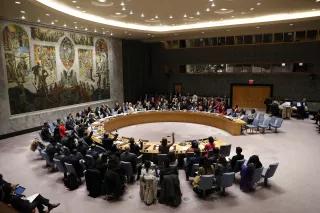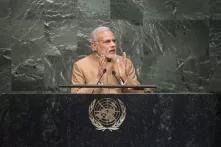Having a non-permanent seat in the United Nations Security Council can provide valuable opportunities for multilateral endeavors. Active engagement of other members in the Council is key to achieving cooperation and safeguarding this institution of multilateralism.

A divided and uncertain world order
The rule-based multilateral order is facing its greatest threat since the Second World War, with the rise of chauvinistic nationalism across the world. Under President Donald Trump, the United States has all but abandoned its role as guarantor of the liberal international world order. The UK’s vote to leave the EU (Brexit) and the growth of right wing populism across Europe is contributing to a decline in the currency of democracy and global human rights discourse. China is entrenching its position as the new superpower and Vladimir Putin’s Russia has put great power rivalry back on the international agenda. In rising powers of the Global South, India and Brazil, right-wing nationalist governments have taken power with destructive policies on citizenship and the environment respectively.
In this fractious and uncertain context, Africa remains the site of multiple intractable violent conflicts increasingly fuelled by climate change and the fight for resources. Yet, Africa is also a region that is strengthening its commitment to multilateralism through the African Continental Free Trade Agreement ratified in 2019 and efforts by the African Union (AU) at bringing peace to countries in conflict. As a continent made up of small and medium sized states, multilateral cooperation is the best way for African states to benefit from the global order. They do not have the power to act individually to achieve their interests so they need international organisations to combine with other states to achieve their goals. South Africa is no exception.
South Africa identifies itself as representing Africa and acting as a bridge-builder between the global North and South. Rules-based multilateralism and promotion of the rule of law are high on the list of priorities in South Africa’s foreign policy. This is a legacy of the anti-apartheid struggle. It was through the initiative of small countries in the UN that the struggle against apartheid was able to become the greatest human rights campaign in human history. South Africa was first brought onto the General Assembly agenda by India in 1946 and from the 1960s it was newly independent African states, like Ghana and Nigeria, which maintained the anti-apartheid struggle in the United Nations (UN). South Africa’s commitment to multilateralism is consistent with its broader commitment to democratise global governance and create a more just and equitable world order.
Given the current assault on the rules-based order, South Africa has entrenched its promotion of multilateralism through the various multilateral organisations in which it plays an active part, including the African Union, G20, BRICS, India-Brazil-South Africa Dialogue Forum (IBSA) and the UN. Since January 2019, the country has held an elected seat in the UN Security Council (UNSC); its third time in this position. Its actions as part of the UNSC are the main focus of this paper. South Africa has used its tenure in the UNSC to promote multilateralism in three main areas. First, it has mobilised the elected ten members (E10) by encouraging regular meetings and cooperation on the intractable issues in the UNSC agenda. Second, it has pursued consensus in difficult issue areas; and third, it has pursued its agenda of increasing cooperation between the UN and regional organisations in terms of Chapter VIII of the UN Charter. These will be discussed below.
1. Mobilising cooperation among E10 members
The shifts in global power dynamics are starkly illustrated by the increasing difficulty in passing consensus resolutions in the UNSC. In 2019, three resolutions have failed because of vetoes. Of the 52 resolutions passed, eight have received fewer than 15 votes. This is in sharp contrast to 2009 where only 3 non-consensus resolutions were passed. For 20 years after the end of the Cold War there was a shift towards consensus decision-making in the Council. Consensus decisions gave the Security Council the appearance of legitimacy because the individual five permanent members cooperated with the majority instead of using their structural power to enforce their particular perspective or interests.
The increased use of the veto and failure to get consensus decisions reflects the return of great power rivalry and division in the Council. Divisions among great powers in the UNSC threaten the ability to resolve any issues on the agenda but they present an opportunity to the elected members to influence decision-making through cooperation.
In November 2018, South Africa co-hosted a workshop with Sweden for the incoming, current and outgoing elected ten members of the UNSC in Pretoria (E10 - Incumbent E10 members in 2018 were Bolivia, Côte d’Ivoire, Equatorial Guinea, Ethiopia, Kazakhstan, Kuwait, the Netherlands, Peru, Poland and Sweden. The incoming members were Belgium, the Dominican Republic, Germany, Indonesia and South Africa). Participants at the workshop, including Germany, discussed opportunities and challenges for E10 cooperation and the role elected members could play in an increasingly divided UNSC. Such cooperation has continued with South Africa regularly coordinating with other E10 members both in New York and Pretoria. This E10 diplomacy has yielded some successes including the consensus passage of Resolution 2493 on Women, Peace and Security.
By engaging in regular cooperation South Africa seeks to build new alliances to maintain and strengthen the rules-based order by circumventing the power politics of the P5 where possible. Germany is one of the countries that South Africa engages with regularly to find areas of cooperation in the UNSC. The agenda on Women, Peace and Security is one of the main areas of cooperation between Germany and South Africa. South Africa advocated for resolution 2467 on conflict-related sexual violence, which was adopted during the German presidency of the UNSC in April 2019. Germany, in turn, strongly supported Resolution 2493, which was passed during South Africa’s presidency of the UNSC in October 2019.
2. Pursuing consensus in difficult issue areas
The process of negotiations on Resolution 2493, illustrates the second aspect of South Africa’s promotion of multilateralism, which is pursuing consensus on difficult issues.
Resolution 2493 was passed on 29 October during the UNSC’s annual debate on women, peace and security (WPS). South Africa drafted the resolution and led the long, difficult negotiations to get the resolution passed. The resolution’s aim was to focus on the “full implementation” of the WPS agenda including protection of women’s sexual and reproductive health rights and women human rights defenders in conflict. The United States opposed the wording on “full” implementation of the WPS agenda because of its implicit reference to sexual and reproductive health. China and Russia opposed explicit language on protecting women human rights defenders in the resolution. Many civil society observers were wary that any resolution passed would be so diluted as to risk rolling back the progress made so far on the WPS agenda. However, South Africa managed to navigate the fractious political environment in the Council for the resolution to pass unanimously. The resolution presents progress in committing UN members to women’s participation in all stages of peace processes and in creating safe and enabling environments for civil society organisations that protect and promote human rights to carry out their work independently.
The strongly worded statements of member states in the debate following the vote on the resolution highlighted the divisions within the Council. P5 members were especially critical of each other’s opposing positions. Importantly, the debate also included statements and interventions by women from countries in conflict, which is part of South Africa’s efforts to strengthen multilateralism by including civil society in UNSC deliberations. Despite the bruising negotiations on Resolution 2493, the successful passage of the resolution contributed to rebuilding consensus in the Council on the WPS agenda and demonstrates that it is possible to cooperate on contentious issues within the Council.
3. Increasing cooperation between the UN and regional organisations
The third way that South Africa is promoting multilateralism is through its focus on greater cooperation between the UN and AU in terms of chapter VIII of the UN Charter. Chapter VIII of the UN Charter offers provision for regional arrangements in the maintenance of international peace and security in line with the principles and purposes of the UN. Article 53 allows enforcement action to be taken by regional arrangements with authorization by the Security Council (UN Charter). This has been a key focus area for the country in all its terms in the UNSC. In 2008, South Africa succeeded in institutionalising annual meetings between the UNSC and the African Union Peace and Security Council (AUPSC) that alternate between New York and Addis Ababa. Given that the majority of country-specific issues on the UNSC agenda are in Africa, the continent’s leaders aim for the UNSC to include the AUPSC in its decision-making, provide logistical and material support for peace missions and allow Africans to take leadership on African peace and security issues. When the AU was formed in 2002, the AUPSC was established as a collective security and early-warning body to manage responses to conflict in Africa.
South Africa has sought to formalise the relationship between the UNSC and the AUPSC to prevent contestation over mandates and authority. The 13th Annual Joint Consultative Meeting between the members of the UNSC and AUPSC and the 4th Informal Seminar between the two Councils took place from 21-23 October 2019. South Africa also co-led (with the United States) a visit to Juba, South Sudan, to engage with the parties in conflict there on the formation of a transitional government in terms of the peace process. South Africa’s active support of cooperation between the UN and the AU serves to strengthen the rules-based order by institutionalising multilateral decision making through regular meetings and development of rules of engagement.
Forming alliances for multilateralism
While multilateralism is under threat, the preceding discussion of South Africa’s actions in the UNSC demonstrates that deliberate effort to practise multilateral ways of engagement can succeed to achieve consensus in major issues on the global agenda. Forming alliances with like-minded states, taking the risk to pursue consensus on contentious issues, involving civil society and engaging regional organisations are all tactics that South Africa has used to promote rules-based multilateralism. South Africa has a great opportunity to continue this work in 2020 when it will hold the chair of the AU, while still serving in the UNSC. It will also hold the position of President of the African Ministerial Conference on the Environment (AMCEN), which is mandated to advance Africa’s shared priorities on climate change. It can use these positions to further form partnerships with like-minded states to strengthen multilateralism and promote stability in world order.
Germany will also hold a regional leadership position in 2020 as EU Council President from July to December. This presents a great opportunity for cooperation with South Africa on major issues in global governance. Chief among these is climate change, whose devastating effects are already being felt in extreme weather events across the world, like the wildfires ravaging Australia. South Africa itself is experiencing an increasing frequency of heat-waves, bush fires and droughts. Germany and South Africa could work together to strengthen multilateral mechanisms of climate governance to achieve the goals of the Paris Agreement. The development and funding of climate change mitigation and adaptation measures for African countries is an area in which the two countries could cooperate in their respective leadership positions. Both Germany and South Africa have stated their commitment to assisting developing countries to adapt and respond to climate change as well as to develop their economies in a sustainable way.
South Africa’s approach of bringing together both like-minded and opposing states in dialogue about contentious issues on the international agenda is difficult but it has yielded some success in the UNSC. This approach could be adapted to address some of the major issues on the agenda in 2020 including taking decisive action on climate change in light of crises such as the wild fires in Australia, calming tensions in the Middle East and mitigating the effects of rising inequality and economic stress on populations across the world.


